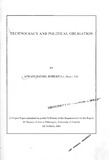| dc.description.abstract | This study revolves around the traditional question of who wields political authority and on what grounds should the led obey him. There is a claim that in a technocratic society, the politician no longer holds and exercises complete political authority, that he shares it with the technocrats.
Before the publication of such works as Daniel Bell's The Coming of Post - Industrial
Society (1973), W. H. G. Armytage's Rise of The Technocrats: A Social History (1965) and other works such as Gendron (1977), Benn (1977), Sklair (1977) and Nelkin (1977), Rotenstrerich (1972) and Tiles and Oberdiek (1995), it was taken unchallenged that the politician holds political authority. These works thus stand as an eye opener, that we cannot take unchallenged the position that the politician wields political authority. These works invite a debate on the possibility of having a different class of individuals, apart from the politicians, which can wield political authority.
This study has developed a position that goes beyond these opposed VIews on technocracy. After a discourse on conceptual development of a technocracy, two views emerge. That either, the politician is subordinate to the technocrat because the technocrat has authority in matters that concern social policy or that the technocrat is a servant in a system that is under the political authority of the politician. In this study we find the former case more genuine given the operations of the teclmocrats.
Through analysis, the study has found out that the democratic system in itself creates avenues for the development of a technocracy. That therefore, someone else other than the politician holds political authority. Having accepted, on the basis of the veil of infallibility, that the technocrat is a solution to all problems, the politician is forced to develop a veil in political goodwill whose purpose is to guise himself before the electorate that he is ,still in political authority. This enables us reflect. on popular mandate
in contradistinction with technical expertise in which case we observe that the two veils form the grounds for social and political obligation in a technocracy.
It is the conclusion of this study that accepting a politician a continued mandate, due to the veil in political goodwill, when it is clear that he will not yield much in comparison to the technocrat, is to logically fall in the trap of the veil of infallibility. In this case, mandating the politician amounts to affirming the social and political authority of the technocrat. This work is a contribution to political philosophy showing through its exposition the need of a technocratic basis for political authority and obligation. | en |

